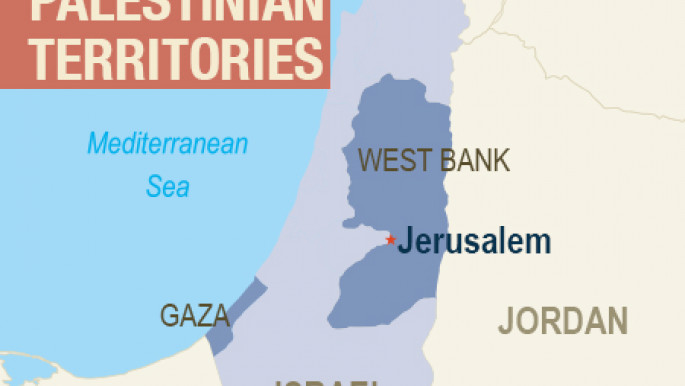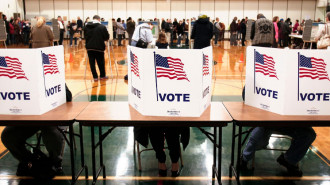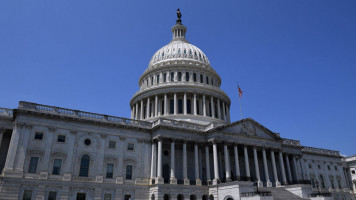Israel to seize occupied West Bank farmland
Israel is moving to declare 150 hectares in the occupied West Bank as "state land" in what would be the largest such expropriation since 2014.
If approved, the annexation will likely draw a barrage of international condemnation, if not action, in line with previous similar moves.
The farmland is located in the Jordan Valley south of Jericho and, according to settlement watchdog Peace Now, would mark the biggest declaration since 400 hectares of Palestinian land were seized in 2014 to expand the giant Gush Etzion settlement bloc - home to around 70,000 Israeli settlers - near Bethlehem.
Virtually the entire international community views Israeli settlements in the territory as illegal or illegitimate, a view supported by international law and the Geneva Conventions.
But Israel says the fate of the settlements should be resolved in peace talks along with other core issues such as security and borders.
Israel captured the West Bank from Jordan in the 1967 war and have held it under military occupation ever since. Palestinians demand the territory as part of their future state.
Palestinian chief negotiator Saeb Erekat, who visited the site on Wednesday, said the land was being stolen from the Palestinians.
"As you see, they call it a security area but you don't see a single security thing here," said Erekat, also secretary-general of the Palestine Liberation Organisation.
"And if you go between here and 70 kilometres (45 miles) straight you will see nothing but farms of grapes, palm trees, vegetables, stealing the water from Palestinians, the land from Palestinians."
 |
They call it a security area but you don't see a single security thing here... You will see nothing but farms of grapes, palm trees, vegetables, stealing the water from Palestinians, the land from Palestinians - Palestinian chief negotiator Saeb Erekat |
 |
The Israeli defence ministry unit that oversees civilian affairs in the West Bank, known as COGAT, said in a statement that "the lands are in final stages to be declared as state lands".
It did not provide further details, including who was considered the current owner.
Peace Now said the land had been taken over by Israeli settlers years ago for farming.
 |
|
Israeli media reported that the land amounted to 150 hectares (370 acres) and said it was north of Almog, a settlement and kibbutz of around 180 people.
Israel has previously built fences, walls and military posts to prevent Palestinians from cultivating certain areas close to settlements, then used a law that dates back to the Ottoman era to declare "unused land" as state land.
It remains unclear if this law is to be invoked in this particular case.
Earlier seizures have been harshly criticised by Palestinians, rights groups and much of the international community.
Such moves erode the territory Palestinians see as part of their future state, further complicating peace efforts.
"The government's decision is another step on the way to destroying the possibility for a two-state solution," Peace Now said in a statement.
The seizure comes at a time of increased attention to Israeli settlements and its policies in the West Bank. Some 60 percent of the West Bank is under full Israeli control and more than 500,000 Israeli settlers live in the territory, including in East Jerusalem.
"We are concerned and perplexed by Israel's strategy on settlements," said US ambassador Dan Shapiro this week, in what are probably the most critical comments from a Washington official over Israeli policy in some years.
The European Union has also strongly opposed Israeli settlement activity and has decided to label products imported from those areas.
EU foreign ministers reiterated in a statement on Monday that the settlements were "illegal under international law, constitute an obstacle to peace and threaten to make a two-state solution impossible".
Ministers also agreed that the EU would ensure that all agreements with Israel should "unequivocally and explicitly" state that they did not apply to the occupied territories.

![Palestinians mourned the victims of an Israeli strike on Deir al-Balah [Getty]](/sites/default/files/styles/image_684x385/public/2024-11/GettyImages-2182362043.jpg?h=199d8c1f&itok=xSHZFbmc)


![The law could be enforced against teachers without prior notice [Getty]](/sites/default/files/styles/image_684x385/public/2178740715.jpeg?h=a5f2f23a&itok=hnqrCS4x)
 Follow the Middle East's top stories in English at The New Arab on Google News
Follow the Middle East's top stories in English at The New Arab on Google News


